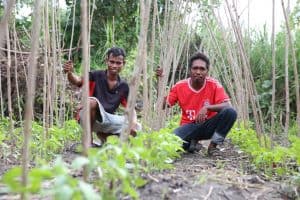About 80% of the population in Timor Leste are small-scale farmers. However, farming does not provide a reliable income, and because agricultural production is low, food insecurity in many farming communities is high.
Due to this, Union Aid Abroad – APHEDA has an ongoing project in Timor Leste to establish farmers’ organisations to overcome some of these problems and encourage the sustainable development of rural communities.
Three Timorese non-government organisations – the Instituto Edukasaun Popular (IEP), Kdadalak Sulimutuk Institute (KSI) and Uniaun Agrikultor Ermera (UNAER) – have teamed up to implement the project across eight districts in Timor Leste.
 The focus is on strengthening local and national farmers’ organisations across the country. These organisations are best placed to identify underused land and appropriate improved farming methods to increase agricultural production. Through this, they can ensure the food security of each household. In the past year, the situation has been improving despite the pandemic, with the establishment of new cooperatives and new training opportunities for farmers.
The focus is on strengthening local and national farmers’ organisations across the country. These organisations are best placed to identify underused land and appropriate improved farming methods to increase agricultural production. Through this, they can ensure the food security of each household. In the past year, the situation has been improving despite the pandemic, with the establishment of new cooperatives and new training opportunities for farmers.
At the beginning of the project, four farmer cooperatives were established. This gives farmers more effective control over their income and allows them to pool their resources to develop community infrastructure. The cooperatives provide farmers with training to develop the skills to participate in a cooperative. With the income they earn from selling produce, the farmers contribute a small amount to the cooperative’s savings. They then collectively decide how to spend this money. This year, one of the cooperatives used their funds to build a house where they can securely store seed and produce.
Training and skills development
Many farmers have attended training and skills development in the past year. This includes training on improved planting methods, organic pesticides, and organic fertilisers. Farmers have also increased their knowledge of agricultural technology and practical financing.
The training they receive is not limited to agriculture. Farmers are also gaining deeper understanding about social, economic, and political issues. The project seeks to strengthen village-level independent organisations to identify and collectively find answers to the agricultural challenges they face. Collectively they are learning to identify issues facing their community and then work with networks of existing NGOs or advocate to the government for help to overcome them. For example, they have identified that if food distribution networks were improved at the district and national levels, farmers can earn more money from their produce. Additionally, the project is also working to include women and people with disabilities. This has led to more women participating in a farmer’s union.
COVID-19 support
When the COVID-19 pandemic hit, these organisations pivoted to prepare rural communities to manage their COVID response. For example, they began to manufacture hand sanitiser and disinfectants as well as educating their communities about how to reduce the risk of spreading COVID-19. Farmers now have the skills, materials and knowledge to protect vulnerable communities in the event of a future outbreak of COVID-19 in Timor Leste.
This program is supported by the Australian Government through the Australian NGO Cooperation Program (ANCP).
